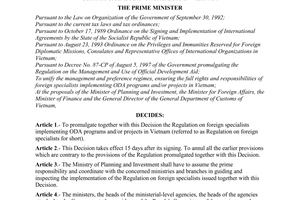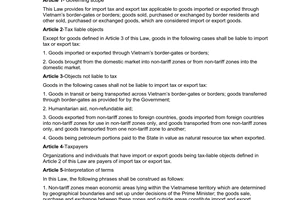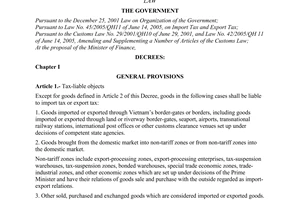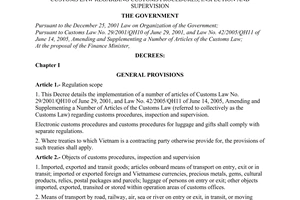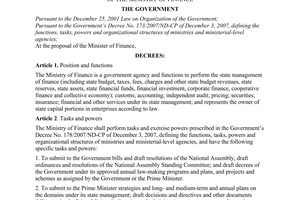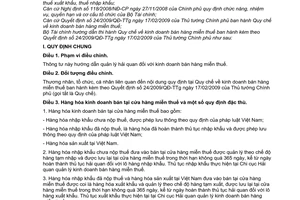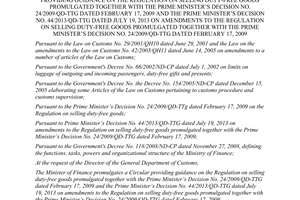Circular No. 120/2009/TT-BTC of June 16, 2009, guiding the regulation on sale of duty-free goods promulgated together with the Prime Minister's Decision no. 24/2009/QD-TTg of February 17, 2009 đã được thay thế bởi Circular No. 148/2013/TT-BTC guidance on the regulation on selling duty-free goods và được áp dụng kể từ ngày 08/12/2013.
Nội dung toàn văn Circular No. 120/2009/TT-BTC of June 16, 2009, guiding the regulation on sale of duty-free goods promulgated together with the Prime Minister's Decision no. 24/2009/QD-TTg of February 17, 2009
|
THE
MINISTRY OF FINANCE |
SOCIALIST
REPUBLIC OF VIETNAM Independence
- Freedom – Happiness |
|
No. 120/2009/TT-BTC |
Hanoi, June 16, 2009 |
CIRCULAR
GUIDING THE REGULATION ON SALE OF DUTY-FREE GOODS PROMULGATED TOGETHER WITH THE PRIME MINISTER'S DECISION NO. 24/2009/QD-TTG OF FEBRUARY 17, 2009
THE MINISTRY OF FINANCE
Pursuant to June 29, 2001
Customs Law No. 29/2001/QH10 and June 14, 2005 Law No. 42/2005/QH11 Amending
and Supplementing a Number of Articles of the Customs Law;
Pursuant to the Government's Decree No. 154/2005/ND-CP of December 15, 2005,
detailing a number of articles of the Customs Law on customs procedures,
inspection and supervision;
Pursuant to June 14, 2005 Law No. 45/2005/ QH11 on Import Tax and Export Tax;
Pursuant to the Government's Decree No. 118/2008/ND-CPof November27, 2008,
defining the functions, tasks, powers and organizational structure of the
Ministry of Finance;
Pursuant to the Prime Minister's Decision No. 24/2009/QD-TTg of February 17,
2009, promulgating the Regulation on sale of duty-free goods;
The Ministry of Finance guides the Regulation on sale of duty-free goods
promulgated together with the Prime Minister's Decision No. 24/2009/QD-TTg of
February 17, 2009, as follows:
I. GENERAL PROVISIONS
Article 1. Scope of regulation
This Circular guides the customs management of sale of duty-free goods.
Article 2. Subjects of regulation
Traders, organizations and individuals governed by the Regulation on sale of duty-free goods promulgated together with the Prime Minister's Decision No. 24/2009/QD-TTg of February 17, 2009 (below referred to as the Regulation).
Article 3. Goods on sale at duty-free shops and some particular provisions
1. Goods on sale at duty-free shops include:
- Imports for which duty has not yet been paid and which are permitted for circulation under the Vietnamese law;
- Imports for which duty has been paid and import procedures have been completed and which are permitted for circulation under the Vietnamese law;
- Goods produced in Vietnam.
2. Imports for which duty has not yet been paid and which are put on sale at duty-free shops shall be managed like temporarily imported goods and stored at duty-free shops for not more than 365 days after customs procedures are completed for import lots. Import procedures shall be carried out at district-level Customs Departments managing the sale of duty-free goods.
3. Imports for which duty has been paid and domestically produced goods on sale at duty-free shops are considered exports and managed like temporarily exported goods and may be stored at duty-free shops for not more than 365 days after customs procedures are completed for export lots. Export procedures shall be carried out at district-level Customs Departments managing the sale of duty-free goods.
4. Traders who need to prolong the duration of temporary import or temporary export of goods specified in Clauses 2 and 3 of this Article shall send written requests for prolongation to provincial-level Customs Departments managing the sale of duty-free goods for consideration. A prolonged duration must not exceed 180 days for an export or import lot.
5. Customs procedures for imports or exports for duty-free sale comply with current regulations on import and export of goods under trading contracts.
6. Duty-free goods traders shall use invoices issued by the Ministry of Finance or an agency authorized by the Ministry of Finance or invoices printed by themselves and permitted by the Ministry of Finance for issuance under current regulations on printing, issuance, use and management of invoices.
7. Cigarettes, liquors, beer and electric and electronic appliances on sale at duty-free shops must be stuck with a "Vietnam Duty Not Paid" stamp on each item.
"Vietnam Duty Not Paid" stamps are issued by the Ministry of Finance. The positions for sticking these stamps on each goods item specified above are guided in the appendix to this Circular.
8. Vietnam dong. USD and EURO are used in transactions at duty-free shops. Selling prices are shown on each good item and shall be converted at exchange rates applied by commercial banks at the time of price posting.
9. Customs offices will neither seal up warehouses and shops nor directly supervise the sale of goods.
II. PROVISIONS APPLICABLE TO DUTYFREE GOODS TRADERS
Article 4. Sale of duty-free goods as a business line
1. Traders may sell duty-free goods only when they fully satisfy the conditions specified in Article 2 and Clause 4. Article 3 of the Regulation.
2. Traders shall ensure that computer networks at their duty-free shops and stores are connected with those of district-level Customs Departments managing the sale of duty-free goods (below referred to as customs offices) under Clause 4, Article 3 of the Regulation, specifically as follows:
a/ For duty-free shops:
- Upon selling goods, salespersons shall enter the following data onto the computer and transmit them to customs offices:
+ Name of buyer;
+ Number of passport or laissez-passer;
+ Flight number and date shown on the boarding pass, for passengers on exit or entry by air:
+ Number of ticket with registered date of exit (for persons waiting exit);
+ Goods appellation, quantity and value.
- At the end of a working day, salespersons shall transmit to customs offices data on inventory at their shops (including goods appellations, codes, quantities and values).
b/ For warehouses of duty-free goods:
- Right after goods are warehoused or ex-warehoused (to duty-free shops or airplanes) warehouse keepers shall enter data thereon onto the computer and transmit the following data to customs offices:
+ Goods appellation, code, quantity and value;
+ Warehoused/ex-warehoused goods under customs declaration No....dated....made at border-gate customs office....
- On the last working day of every week, warehouse keepers shall transmit data on warehouse inventory (goods appellations, codes, quantities sand values) to customs offices.
3. Traders shall send to Customs Departments of provinces or centrally run cities where they locate their duty-free shops and warehouses dossiers of request for certification of eligibility for inspection and control of duty-free shop or warehouse locations under Clause 4, Article 3 of the Regulation. Such a dossier comprises:
- A written request (enclosed with the site plan): one original;
- The business registration certificate or investment certificate: one notarized copy.
4. After receiving traders' dossiers of request and conducting physical inspection, provincial-level Customs Departments shall report inspection results to the Customs Directorate for written certification of eligibility or ineligibility for customs inspection and control of duty-free shop and warehouse locations proposed by traders.
Article 5. Responsibilities of duty-free goods traders
Apart from the responsibilities specified in the Prime Minister's Decision No. 24/2009/QD-TTg of February 17, 2009, the Ministry of Finance gives the following specific guidance:
1. Duty-free shops and warehouses may only store goods for which customs procedures have been completed. Goods items in shops and warehouses must be properly placed to facilitate customs inspection when necessary.
2. After completing import procedures or before exporting goods from warehouses to shops for sale, traders shall stick "VIETNAM DUTY NOT PAID" stamps on each goods item, for imports required to be stuck with such stamps.
3. Since duty-free goods are managed like temporarily imported or exported goods, traders shall take full responsibility before law for goods quality and food hygiene and safety upon carrying out customs procedures or selling goods under law.
4. Traders shall send monthly sales reports (made according to a set form) to customs offices in the first week of the subsequent month for the latter's inspection, monitoring (conciliation) and liquidation of import declarations.
5. Based on monthly reports, biannually and annually, traders shall report on sale of duty-free goods to the Customs Directorate.
III. PROVISIONS ON CUSTOMS OFFICES MANAGING THE SALE OF DUTY-FREE GOODS
Article 6. Responsibilities of customs offices
1. Customs offices managing the sale of duty-free goods are district-level Customs Departments (below referred to as customs offices) designated by provincial-level Customs Departments according to their competence.
2. Customs offices managing the sale of duty-free goods shall:
a/ Carry out customs procedures for imports and exports for duty-free sale.
b/ Liquidate declarations of goods temporarily imported or exported.
c/ Base themselves on import and export declarations, management and monitoring records, sales reports, warehousing and ex-warehousing bills, bills for consignment of goods into duty-free shops and actual conditions of goods at shops and warehouses to inspect the warehousing, ex-warehousing, consignment of goods into shops, inventories and unsold goods at shops.
d/ Every month, inspect sale invoices of shops to monitor (conciliate) and liquidate declarations of imports and exports sold or imports wholly re-exported in the first week of the subsequent month.
e/ Manage and monitor goods items for sale at duty-free shops by keeping monitoring records or by means of computers connected between customs offices and traders.
f/ Collaborate with traders in installing computer networks to receive data from traders under Points a and b, Clause 2, Article 4 of this Circular.
g/ Handle violations of traders detected in the course of management, monitoring and liquidation of import or export declarations, depending on their nature and severity.
IV. DUTY-FREE GOODS BUYERS, BUYING CONDITIONS AND QUANTITATIVE LIMITS
Article 7. Persons on exit or in transit who buy goods at duty-free shops in border gates of departure specified at Points a and b, Clause 1, Article 5, and Clause 1, Article 6 of the Regulation:
1. Before selling goods to these persons:
Salespersons shall check the following papers:
a/ Passports or exit or entry laissez-passers under regulations.
b/ Boarding passes for persons on exit or in transit by air (in this case, buyers are not required to produce their passports for checking).
c/ Persons on exit who buy duty-free goods of a total value exceeding the limit subject to compulsory customs declaration as prescribed by the State Bank of Vietnam for the currency they use to buy the goods shall produce to salespersons documents evidencing the origin of sums in that currency under the regulations of the State Bank of Vietnam, unless they have withdrawn such cash from automatic teller machines in the departure lounge or they pay for duty-free goods by credit cards.
2. Upon selling goods to these persons:
Salespersons shall:
a/ Fully and accurately fill in sale invoices. Particularly for persons on exit or in transit by air. information on flight number and date must be added.
b/ Keep sale invoices for each sale day (or in rolls if sale invoices are issued in rolls).
c/ Keep copies of documents evidencing the origin of sums of money paid for duty-free goods under the regulations of the State Bank of Vietnam (if any).
3. Traders may process duty-free goods for retail sale at restaurants and boarding rooms in international airports to passengers on exit or in transit.
Particularly for sale invoices, the buyer name line shall be filled in with the words "retailed goods" while information on flight number and date is not required. Other lines in an invoice must be fully filled in under regulations.
4. In case tourists in groups
who travel by sea and stay within a day and hold valid passports or entry or
exit laissez-passers without entry visas or entry or exit declarations buy
duty-free goods, salespersons shall comply with Clause 2 of this Article.
Particularly, they shall write in sale invoices the ship names. Shop assistants
shall
deliver goods to tourists immediately after the
latter complete exit procedures.
Article 8. Passengers on exit who buy goods at duty-free shops in inner cities specified at Point c. Clause 1, Article 5 and Clause 1, Article 6 of the Regulation
1. Before selling goods to these persons:
Salespersons shall check the following papers:
a/ Valid passports.
b/ Tickets showing registered date of exit.
2. Upon selling goods to these persons:
Salespersons shall:
a/ Fully and accurately fill in sale invoices (each having three originals), and have these invoices signed by buyers;
b/ Put small goods and their sale invoices (two originals) into special-use plastic bags and seal up these bags (with seals of shops);
c/ Give these bags to buyers for preservation and production to customs offices of border gates of departure;
d/ Keep sale invoices (one original) for each selling date.
3. Responsibilities of duty-free shops in inner cities:
a/ To transport bulk goods and collaborate with border-gate customs offices in delivering these goods to buyers in the departure rooms of the border gates.
b/ To pay fully the duty under the current law for sold goods in case buyers produce these goods to customs offices of border gates of departure, in insufficient quantities compared with those stated in sale invoices or duty-free shops do not have sale invoices (originals certified by customs offices of border gates from which buyers have exited) upon dossier liquidation.
c/ In the last week of every month, to contact customs offices of border gates from which buyers have exited to carry out procedures for receiving all sale invoices already certified by customs offices.
4. Responsibilities of customs offices of border gates from which buyers exit:
a/ To receive goods from buyers or duty-free shops in inner cities;
b/ To check seals of duty-free shops;
c/ To physically inspect goods against their sale invoices; to give certification in sale invoices by signing and appending officer stamps on the back side of each sale invoice (2 originals);
d/ To hand one original of a sale invoice to the buyer and keep another original;
e/ To carry out procedures for handing over all certified sale invoices to duty-free shops in the last week of every month.
Article 9. Passengers buying duty-free goods on board outbound flights specified in Clause 2. Article 5 and Clause 1, Article 6 of the Regulation
1. Salespersons shall guide buyers on board to fully fill in orders for goods (according to a set form) and keep these orders for use as documents for liquidation with customs offices. Orders shall be printed, managed and used by traders.
2. Within 24 hours from the time airplanes park at places indicated by international airport authorities, traders shall submit to customs offices a detailed list of goods sold on each outbound flight. Such a list must indicate full names of buyers; flight number and date; goods appellations, quantities and values; and be certified by the salesperson or his/her lawful representative and enclosed with a general invoice for use by customs offices as a basis for inspection and liquidation of ex-warehousing bills.
Article 10. Agencies, organizations and individuals entitled to diplomatic privileges and immunities and buying duty-free goods at duty-tree shops in inner cities specified in Clause 3, Article 5 and Clause 2, Article 6 of the Regulation
1. Before selling goods to these persons:
Salespersons shall check the following papers:
a/ Passports, diplomatic identity cards and diplomatic notes (in case of buying goods for agencies or organizations).
b/ Books of duty-free goods allowances.
c/ Letters of authorization for buying goods (in case of buying goods under authorization).
d/ Permits of provincial-level Customs Departments (for duty-free automobiles and motorcycles).
2. Upon selling goods to these persons: Salespersons shall:
a/ Fully and accurately fill in sale invoices.
b/ Cut off stamps from stamp books corresponding to sold goods, and stick them on sale invoices.
c/ Keep sale invoices for each selling date.
d/ Keep papers specified at Points c and d. Clause 1 of this Article.
Article 11. Persons entitled to tax incentives provided by the Prime Minister and buying goods at duty-free shops in inner cities specified in Clause 3, Article 5 and Clause 2, Article 6 of the Regulation
1. Before selling goods to these persons: Salespersons shall check the following papers:
a/ Passports.
b/ Written certification by competent state agencies (for buyers being ODA experts defined in the Prime Minister's Decision No. 211/1998/ QD-TTg of October 31, 1998, or overseas Vietnamese invited to work in Vietnam under the Prime Minister's Decision No. 210/1999/QD-TTg of October 27, 1999).
2. Upon selling goods to these persons:
a/ Duty-free shop leaders shall give certification and make conciliation on documents specified at Point b. Clause 1 of this Article, for quantities of goods bought at their shops.
Salespersons shall:
b/ Fully and accurately fill in sale invoices.
c/ Keep sale invoices for each selling date.
d/ For documents specified at Point a, Clause 2 of this Article:
- Keep copies with certification and conciliation by shop leaders, if buyers have not yet bought up duty-free allowances.
- Keep originals with certification and conciliation by shop leaders, if buyers have bought up duty-free allowances.
Article 12. Crewmembers of international transportation ships specified in Clause 4, Article 5. and Clause 3, Article 6 of the Regulation
1. In case of buying duty-free goods for common daily-life needs of ship crewmembers during the period of anchoring or mooring at Vietnamese seaports:
a/ Ship crewmembers may buy only once duty-free goods of the following quantities at duty-free shops:
- Liquor of an alcoholic volume of 220 or higher: 1.5 liters.
- Liquor of an alcoholic volume of under 22°: 2 liters.
- Other alcoholic drinks and beer: 3 liters.
- 400 cigarettes.
- 100 cigars.
b/ Provisions on sale of goods:
- Shipmasters/ship representatives shall make. on their ship crews' behalf, orders (in written or electronic form, such as email, facsimile) for goods to be bought only once for all crewmembers.
- Salespersons shall:
+ Check orders and crew lists.
+ Write on sale invoices the full name and passport number of the shipmaster/ship representative, ship number and date of entry, and sign these invoices.
+ Keep sale invoices, goods orders and crew lists for use as bases for liquidation of customs declarations.
2. In case of buying duty-free goods for crewmembers' needs for the next voyage of their ships outside the Vietnamese territorial sea. these goods may be bought at duty-free shops in border gates from which the ships depart.
a/ Provisions on sale of goods:
- Shipmasters/ship representatives shall make orders according to crewmembers' needs.
- Salespersons shall:
+ Check orders and crew lists.
+ Write on sale invoices the full name and passport number of the shipmaster/ship representative, ship number and date of entry, and sign these invoices.
+ Keep sale invoices, orders and crew lists for use as bases for liquidation of customs declarations.
b/ Goods bought at duty-free shops according to orders for crewmembers' needs for the next voyage (for use outside the Vietnamese territorial sea) must be kept in ship storages for sealing and actual export certification (signed and appended seals on sale invoices by customs officers) and supervision by customs offices of border gates from which the ships depart till their actual departure.
3. If there is no duty-free shop in an international seaport, a duty-free shop in a seaport in the nearest province or city will be allowed to sell duty-free goods to persons specified in Clauses 1 and 2 of this Article.
When delivering goods from warehouses/ shops to seagoing ships according to orders, traders shall make ex-warehousing/ex-shop bills, clearly indicating goods items, quantities and values, and submit them to customs offices of border gates from which the ships depart. Selling procedures comply with Clauses 1 and 2 of this Article.
V. CUSTOMS MANAGEMENT OF IMPORTS FOR WHICH DUTY HAS BEEN PAID AND GOODS MADE IN VIETNAM ON SALE AT DUTY-FREE SHOPS
Article 13. Goods made in Vietnam
1. Goods made in Vietnam include goods produced from domestic raw materials and supplies, and those produced from imported raw materials and supplies.
2. Goods made in Vietnam on sale at duty-free shops are those not on the list of goods banned from export. If they are subject to conditional export, permits of specialized management agencies under law are required.
Article 14. Customs procedures for imports for which duty has been paid and goods made in Vietnam
Procedures for imports for which duty has been paid and goods made in Vietnam on sale as exports at duty-free shops comply with the goods policies prescribed by law.
1. Responsibilities of traders:
1.1. Selling traders shall register export declarations (HQ/2002-XK), buying traders (duty-free goods traders) shall register import declarations (HQ/2002-NK) as for goods exported and imported under trading contracts.
a/ Particularly for imports for which duty has been paid, the following papers are additionally required: import declarations and tax receipts (copies certified, appended seals and signed by enterprise directors).
b/ Customs procedures shall be carried out at district-level Customs Departments managing the sale of duty-free goods.
1.2. Every day, based on sale invoices, buying traders shall sum up quantities of goods sold in the day for making sales reports.
1.3. Based on monitoring records or data on computers connected with customs computer networks and daily sales reports, when imported goods quantities indicated in declaration form HQ/2002-NK have been sold out, buying traders shall notify such to selling traders to jointly contact customs offices for inspection, comparison and actual export certification.
2. Responsibilities of customs offices:
2.1. Customs offices shall carry out import or export procedures for goods lots under current regulations.
- Particularly for declaration form HQ/2002-XK, they shall certify the completion of customs procedures and append a seal in box 26. not in box 27.
- They shall separately monitor duty-free goods through record keeping or computers networked between them and traders.
2.2. Pursuant to Point 1.3. Clause 1 of this Article, a customs office shall certify the actual export in box 27 of declaration form HQ/2002-XK (one duplicate kept by the customs office, the other kept by the customs declarant) and liquidate the dossier under regulations.
2.3. Customs offices shall carry out procedures for duty refund under the tax law.
VI. CUSTOMS MANAGEMENT OF IMPORTS INTENDED FOR SALE AT DUTYFREE SHOPS BUT THEN USED FOR OTHER PURPOSES
Article 15. For goods to be re-exported
1. Traders shall submit to customs offices the following papers:
- Written request for re-export.
- Permit of the Ministry of Industry and Trade (for imports requiring such permit).
2. Re-export procedures shall be carried out under current regulations like customs procedures for re-exported goods lots.
Article 16. For goods for domestic sale
1. Traders shall submit to customs offices the following papers:
- Written request for transfer of goods for domestic sale, indicating each goods item. code, quantity and value.
- Permit of the Ministry of Industry and Trade (for goods items requiring such permit for their import).
2. Customs procedures for goods transferred for domestic sale comply with current regulations like those for goods imported under trading contracts.
VII. LIQUIDATION OF DOSSIERS
Article 17. Liquidation dossiers
A liquidation dossier comprises:
- A written request for liquidation;
- An import declaration (kept by the customs declarant): the original;
- Documents on sale of goods to duty-free goods buyers of different categories specified in Section IV of this Circular: copies to be submitted and originals to be produced;
- A monthly sales report of the trader: a copy:
- Other documents (if any).
Article 18. Liquidation procedures
1. Once every month, customs offices shall liquidate customs declarations for goods sold in the month in the first week of the subsequent month. Upon inspection and liquidation by customs offices, traders shall produce dossiers specified in Article 17 of this Circular and records and documents on management and monitoring of relevant business operations of traders (at the request of customs offices).
2. Within 10 days after goods are sold out or the expiration of the duration of goods retention, traders shall submit to customs offices liquidation dossiers specified in Article 17 of this Circular.
3. In the course of liquidation, when finding it necessary customs offices shall inspect quantities of inventories in warehouses and duty-free shops. Annually, customs offices shall inspect these inventories.
4. After liquidating customs declarations, traders shall keep sale dossiers under accounting regulations.
5. Liquidation for broken, damaged, deteriorated or substandard goods:
5.1. For goods which are broken during transportation or preservation, damaged, deteriorated or substandard, traders shall submit written explanations to customs offices, clearly stating reasons for damage, deterioration or substandard quality, and goods appellations, codes, quantities and values. Based on explanations and actual conditions of goods, customs offices shall certify these goods.
5.2. Traders shall destroy these goods under regulations on destruction of scraps under customs supervision; and report to the Customs Directorate on destruction results.
5.3. Duties on destroyed goods comply with current tax laws.
VIII. IMPLEMENTATION PROVISIONS
Article 19. Effect
1. This Circular takes effect 45 days from the date of its signing. To annul the Ministry of Finance's Decision No. 77/2004/QD-BTC of September 28, 2004, prescribing customs management of goods on sale at duty-free shops, and relevant guiding documents.
2. The Customs Directorate shall guide the liquidation of declarations of imports for sale as duty-free goods for which procedures were completed before July 1, 2009.
3. The Director General of Customs shall direct directors of concerned provincial-level Customs Departments in organizing, managing and monitoring the implementation of this Circular.
|
|
FOR
THE MINISTER OF FINANCE |
APPENDIX
POSITIONS FOR STICKING "VIETNAM DUTY NOT
PAID" STAMPS ON DUTYFREE GOODS
(To the Ministry of Finance's Circular No. 120/2009/TT-BTC of June 16, 2009)
1. Cigarettes: Either end of cartons.
2. Liquor in bottles (including jars and decanters): The lower part of the bottle neck. For liquor bottles contained in boxes with manufacturer's special preservation (wax or lead seals), stamps shall be stuck in the center of the top of the box above the bottle.
3. Beer of all kinds: any side of carton containers. Lids of barrels, for beer contained in barrels of 3 liters or more.
4. Electric fans of all kinds: Top of the fan casing. The upper left comer of the front side for box-type fans (i.e ventilators).
5. Refrigerators: The right corner of the top.
6. Electric rice cookers: The casing, above the power socket.
7. Electric thermo-flasks: The casing, above the power socket.
Non-electric thermo-flasks: Stamps shall be stuck vertically on the mounting plate between the flask casing and base. If there is no mounting plate, stamps shall be stuck vertically on the upper part of the casing (flask neck).
8. Gas cookers: The right corner of the top.
9. Video recorders: The back right corner of the top.
10. TV receivers of all kinds: The upper part of the back side.
11. Air conditioners: The right corner of the top. The right corner of the top of the indoor unit, for two-unit air conditioners.-
